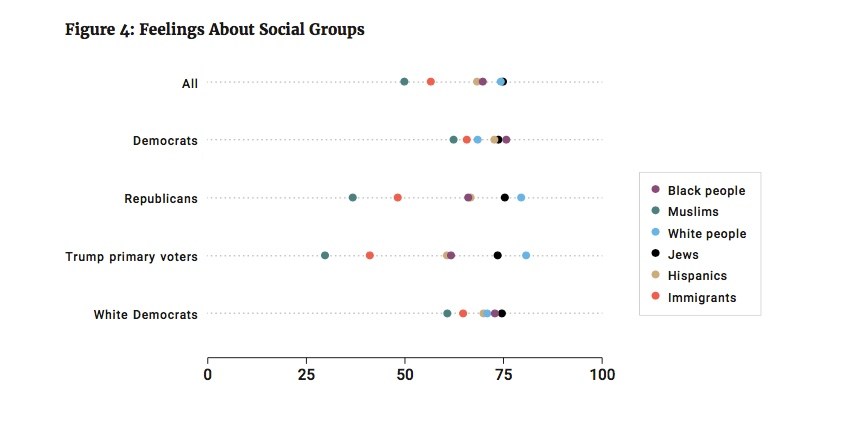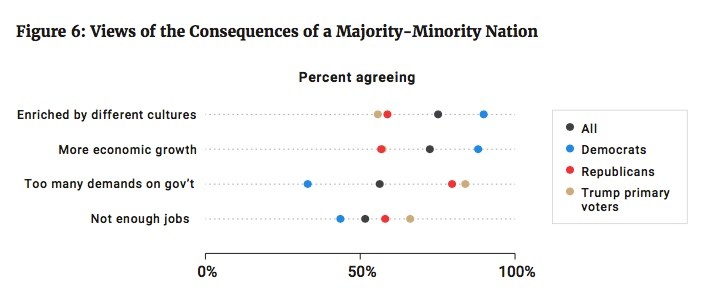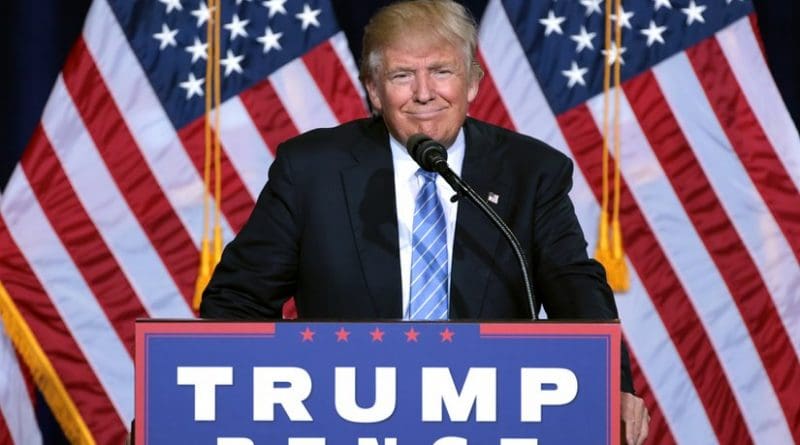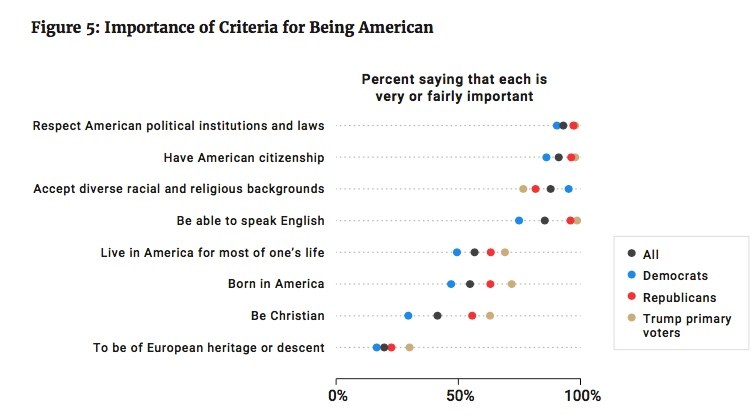Post-Election Survey Finds Ethnocentric, Identity Politics Factors In Election – OpEd
By Mitchell Blatt*
Trump supporters don’t terribly like immigrants or Muslims, and white Democrats like African-Americans more than white Americans.
Those are some of the findings of a large-scaled post-election study by John Sides, professor of political science at George Washington University. The survey data comes from multiple surveys by YouGov of 45,000 respondents, including 8,000 respondents who were interviewed both in 2011-2012 and 2016. One of the questions asked voters to rate certain ethnic and religious groups on a thermometer scale: A few things that can be said:
A few things that can be said:
- For all groups surveyed, immigrants and Muslims rated second to last and last, respectively, but the difference was much greater with Republicans and Trump primary voters.
- Trump voters ranked white people more favorably than any other group ranked them and ranked minorities (excluding Jews) lower than every other group.
- While Trump voters ranked Jews slightly lower than did Republicans as a whole, their rating of Jews is lined up pretty evenly with the rating of Jews by Democrats, white Democrats, and the population at large–around 75.
- Democrats ranked blacks, Hispanics, and Jews noticeably higher than they ranked whites. Even white Democrats ranked blacks and Jews slightly higher than they ranked whites. The gap in the ratings of whites by Democrats as a whole is thus due partially, but not entirely, to the fact that there were many more blacks and Hispanics represented in the survey sample of “Democrats” (as opposed to “white Democrats”).
- Trump voters ranked blacks slightly more favorably than Hispanics, while Republicans as a whole ranked Hispanics slightly more favorably. It can be hypothesized that Trump’s intense focus on immigration and illegal immigration attracted voters who held more unfavorable views of Hispanics.
- Overall, the ranking order of groups by Trump primary voters seems to align with the frequency and intensity of attacks Trump made on various groups. Take the distinction in rankings between blacks and Hispanics: Trump railed non-stop against illegal immigration and even went so far as to accuse a Hispanic judge (whom he referred to as “Mexican”) of being biased on account of his ancestry. His comments about African-Americans were less direct, couched in tone deafness appeals to make urban “hellholes” safer, and his comments about Jews, the few times he mentioned Jews, were often veiled in symbolism (the Star of David tweet). As for Muslims, he said he would ban them from entering the country.
What it Means to be an “American”
The clash of identity politics was evident in voters’ ideas about what it means to be an “American,” a word that is often thrown around, but is interpreted by some to mean “white” and by Democrats and Republicans as emphasizing different sets of values. Predictable divergences arise in the above survey results.
Trump voters were the most likely of all to hold ethnocentric and identity politics-influenced views about being an American, and Rubio voters were more likely than Cruz voters:
However, nearly one-in-three (30 percent) of Trump primary supporters said that European heritage is important. Fewer supporters of other Republican primary candidates endorsed this criterion—9 percent of Kasich supporters, 16 percent of Cruz supporters, and 22 percent of Rubio supporters.
About 63 percent of Republicans, and 69 percent of Trump primary voters, said that it is important to have lived in America for most of one’s life. Fewer Democrats (49 percent) agreed with this. Similarly, 63 percent of Republicans and 72 percent of Trump primary voters said that being born in America is important to being American. About 47 percent of Democrats agreed. Finally, there were larger di erences in terms of whether being Christian is important: 30 percent of Democrats, 56 percent of Republicans, and 63 percent of Trump primary voters considered this fairly or very important.
Another question of interest is what voters think about living in a majority-minority nation, a likely future for the U.S. based on demographic trends.
Voters were asked if they agree with the following statements, including that with a more diverse population, “There will not be enough jobs for everybody.”
That seems like a very stupid contention. Whether or not there are “not enough jobs” shouldn’t have anything to do with the racial composition of a place. People of all races compete for jobs. Two countries of the same population, one that is 100% racially homogenous and another that is majority-minority, would both have the same number of people competing for jobs. They would also have the same number of consumers creating demand, for that matter, so it can be expected that the number of jobs would increase in the long-term due to increased demand. A more plausible argument is that the skill sets of the populations might have an impact on which areas of the economy faced greater competition.
However, even if the statement isn’t rational from an objective perspective, it is one way to gauge public opinion about diversity. One negative statement that was lacking from the question set, however, was asking respondents whether they thought increased diversity might result in increased social divisions, a possibility that some voters might have selected if asked.
Broadly, Sides points to data that suggests a larger proportion of voters were motivated by views on race and identity politics in 2016 than in 2012. In 2012, voters who held negative views of blacks were more likely to vote Democrat than they were in 2016. I have two theories, which are not mutually exclusive, for why:
- The Republican nominees in 2008 and 2012 were ideological conservatives who didn’t emphasis race, identity, or immigration to a large degree. By contrast, Trump wasn’t very ideologically conservative but did emphasis identity politics. “White working class” voters who are not ideologically conservative on economic issues thus would have little reason to vote for Romney and more reason to vote for Trump. At the same time, ideological conservatives who are not motivated by identity politics had less reason to vote for Trump than for Romney. Thus Clinton had success in some highly educated, affluent conservative suburbs; the Democratic nominee won Orange County, birthplace of Richard Nixon, for the first time since the Great Depression.
- Liberal and Democratic rhetoric and policies have increasingly emphasized identity politics in recent years. The language of “intersectionality” pushes identity to the forefront, asking whites, Asians, and Jews to account for their “privilege.” Whenever a news event happens, there is a jump to talk about the identity of the person involved, resulting in headlines like this one from the Huffington Post: “North Korea Proves Your White Male Privilege Is Not Universal.” The rise of Black Lives Matter, which coincided with riots in Ferguson and Baltimore, also put racial divisions at the forefront. It is not surprising in this atmosphere, which emphasises identity, that white conservatives would also be more motivated by their ethnic identity.
Now here are some related articles from B+D about identity politics and Trump’s appeals to racism:
Trump tweeted white supremacist “#WhiteGenocide” tweets in January
Trump tweeted “Star of David” tweet attacking Clinton for “corruption”
Trump refused to condemn the KKK when asked on CNN
Blatt at The Federalist: Trump is Killing Republicans with Minorities
Exit polls: Trump underperformed Bush, other pre-Obama Republicans with minority voters
And on liberal identity politics:
How left-wing smears about racism come back to bite them
Bill Clinton and Barack Obama break from liberal political correctness
“Black Lives Matters have also ideologically expanded”: Chat with Robbie Travers
*Mitchell Blatt has been based in China and Korea since 2012. A writer and journalist, he is the lead author of Panda Guides Hong Kong guidebook and has contributed to outlets including The National Interest, National Review Online, Acculturated, and Vagabond Journey. Fluent in Chinese, he has lived and traveled in Asia for three years, blogging about his travels at ChinaTravelWriter.com. You can follow him on Twitter at @MitchBlatt.
This article was published at Bombs and Dollars.


